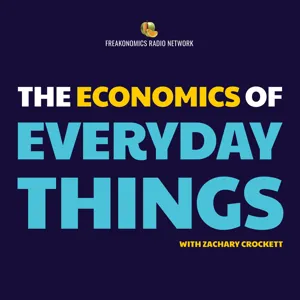Podcast Summary
The Deceptive World of Carnival Games: Tricks, Manipulation, and Disappointment: Carnival games are intentionally rigged to decrease the chances of winning, leading to frustration and disappointment for players. Manufacturers are aware of this and employ strategies to deceive players.
Carnival games at fairs and amusement parks can be rigged to make it difficult for players to win. These games often evoke a sense of hope and excitement, enticing people to spend money for a chance at winning a prize they may not even want. The conversation reveals that suppliers of carnival games, like Redbone Products, are aware of these dynamics. They manufacture games and make the rules tighter, intentionally reducing the probability of winning the big prizes. This manipulation ultimately leads to disappointment and frustration for many people. Furthermore, the carnival game business is often passed down through generations, creating a tight-knit community of suppliers who are familiar with the tricks of the trade. Overall, this conversation highlights the misleading nature of carnival games and sheds light on the strategies employed by game manufacturers.
The Secrets of Carnival Game Success: Carnival games thrive on constant replacement of parts, require careful design considerations, and rely on public participation for financial success.
The success of carnival games relies on the constant replacement of game parts and custom specifications. Balloons, balls, and ducks are the highest selling items due to their frequent need for replacement. The design process for carnival games involves considering specific requirements, such as the sound made when a ring hits a glass bottle. The odds are intentionally not in the players' favor, as regulation rims are compressed or smaller to minimize the number of winners. Carnival operators pay a significant amount for innovative game designs, with prices ranging from $3,000 to $30,000. Once the games are set up, the public ultimately decides the financial success of the carnival by choosing which games to play and spend money on.
The Calculated Strategies Behind Carnival Games: Carnival game operators use calculated strategies and adjust game difficulty levels to minimize payouts, protect against professional players, and make a living.
Carnival games are not based on pure luck, but rather on calculated strategies by the operators. While players may obsess over their odds of winning, carnival workers are more concerned with their own odds of losing, known as "throwing stock." They aim to pay out as little as possible for every dollar they take in. This means that the difficulty level of games can be adjusted, such as changing the distance between glass plates or manipulating the angle on a whiffle board. Additionally, carnival operators take measures to protect against "sharpies" or professional players who know all the tricks. However, despite the calculated nature of carnival games, it is acknowledged that game operators need to make a living as well.
The hidden truths behind carnival games: Carnival game operators prioritize profit over fairness, often making it nearly impossible to win valuable prizes. High expenses make it difficult to break even on rent alone.
Carnival games are purposely designed to be difficult to win, but sometimes, the companies that own the booths take it too far and make it almost impossible. Game operators are given strict instructions to regulate the prizes they award, even if it means sacrificing fairness. They are told not to let anyone walk around with prizes that aren't small and cheap. The prizes themselves aren't valuable, with operators paying only around a dollar for most of them. Live prizes like goldfish can even cause inventory problems when they die. Carnival game operators face tight profit margins, having to cover rent, labor, utilities, transportation, and prize costs. With high expenses, it takes a significant number of games just to break even on rent alone.
The Carnival Industry: Honesty, Investment, and Fairness: The carnival industry is primarily composed of honest small business owners who invest in their games, with strict rules in place to ensure fairness and an enjoyable experience for customers.
The carnival industry, although prone to some rigged games, is predominantly comprised of honest small business owners who invest significant amounts of money to operate their games in good faith. While there are instances of unscrupulous practices, such as tricking customers into playing games they have minimal chances of winning, these operators are considered outliers and not representative of the majority. Olivia Turner emphasizes that there are strict rules in place to ensure fairness, and she maintains that every game sold at Redbone can be won. It is important to recognize that the carnival industry's reputation depends on providing a fair and enjoyable experience for customers.
Be cautious and question, but also consider the worth of winning trivial prizes.: Carnival games may hold sentimental value, but it's important to consider the financial implications before investing excessive amounts of money. Approach life with caution and don't expect easy wins.
When it comes to carnival games, it's important to be cautious and ask questions. Like Gryczan suggests, if something seems suspicious, don't hesitate to inquire about it. Follow the rules, as breaking them can result in serious consequences. However, one must also question the worthiness of spending money on winning trivial prizes. As Gryczan points out, these prizes may hold sentimental value but often have little material worth. It is crucial to consider the financial implications before investing excessive amounts of money in the pursuit of such trophies. Additionally, this conversation serves as a metaphor for life, reminding us that not every endeavor will result in victory. Approach life with a mix of fun and caution, and don't be overly optimistic about easy wins.






